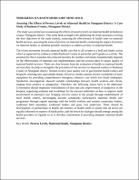| dc.description.abstract | NDIBAREMA WA BAITWABABO (2007-MO93-10113)
Assessing The Effects of Poverty Levels on Maternal Health in Ntungamo District: A Case Study of Rushenyi County, Ntungamo District.
The study was carried out on assessing the effects of poverty levels on maternal health in Rushenyi county, Ntungamo district. This study dealt at length with addressing the study questions covering the four objectives of the study namely; analysing the effectiveness of health units on maternal health services, assessing the status of poverty on maternal health, examining the impact of poverty on maternal health, to establish possible measures to address poverty on maternal health.
The recent movement towards maternal health care free to all women is a bold and timely action which is supported by evidence within Rushenyi County in particular and Uganda as a whole. The potential for this to translate into reduced mortality for mothers and infants fundamentally depends on the effectiveness of maternal care implementation and the actions taken to assure quality of maternal health services. There are clear lessons from the evaluation of health on maternal health services that can help to strengthen the provision of free services to maternal women in Rushenyi County in Ntungamo district. Women receive poor quality care in government health centres and hospitals, resulting into unavoidable deaths. However, health systems involve availability of basic equipment for providing comprehensive emergency obstetric care which was found inadequate. Qualitative investigations showed variable relationships between health workers and clients, ranging from positive to antagonistic. Therefore, the following issues have to be addressed: Government should emphasise redistribution of duty and also improvement of manpower in the hospital, organising seminars and workshops by the relevant authorities on how to improve male involvement in antenatal care, bringing services nearer to the people through establishment of more health centres, encouraging focused community participatory maternal health care programme through regular meetings with the health workers and women community leaders, traditional birth attendants, traditional leaders and grass root politicians. There should be development of partnerships in health; the ministry of health needs to ensure that all actors are equally informed on matters of health policy and the forum for dialogue should emerge among the health providers in Uganda so as to develop commitment in providing adequate maternal health services.
Key Words: Poverty Levels, Maternal Health, Ntungamo District. | en_US |


